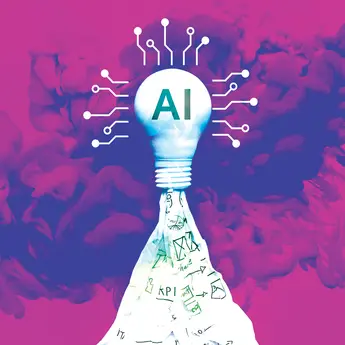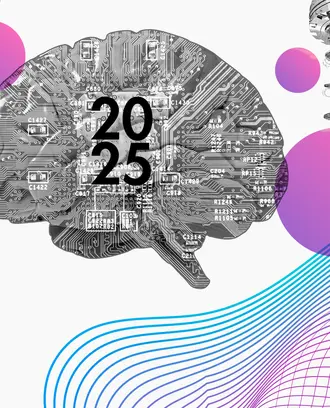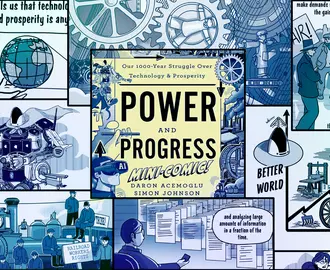Economics
Insights from MIT’s newest Nobel laureates on AI, labor, and more
Daron Acemoglu and Simon Johnson won this year’s economic prize for work on institutions and prosperity. Their research on AI, labor, and automation point the way to a future of shared well-being.
The 2024 Nobel Memorial Prize in Economic Sciences was awarded Monday to MIT Institute professor and MIT Sloan professor PhD ’89, along with University of Chicago professor James A. Robinson, for “studies about how institutions are formed and affect prosperity.”
“Societies with a poor rule of law and institutions that exploit the population do not generate growth or change for the better. The laureates’ research helps us understand why,” the prize committee said in its announcement.
Acemoglu and Robinson are co-authors of the prominent book “Why Nations Fail,” from 2012. In recent years, Acemoglu and Johnson have written extensively about the relationship between technological innovation and inequality. Their 2023 book, “Power and Progress: Our Thousand-Year Struggle Over Technology and Prosperity,” looks at the economic and social damage caused by the concentrated power of business and shows how computing advances of the past half century can become empowering and democratizing tools.
“We are in the age of AI,” Acemoglu said at a press conference Monday, “but I remain convinced that human productivity, human ingenuity, [and] human resources broadly construed are still key to [the] meaningful flourishing of countries.”
Acemoglu, Johnson, and MIT economist David Autor are faculty co-directors of the MIT Shaping the Future of Work Initiative, which analyzes forces “eroding job quality and labor market opportunities for non-college workers and [identifies] innovative ways to move the economy onto a more equitable trajectory.”
Previously, at least two faculty members affiliated with MIT Sloan have won the Nobel Memorial Prize in Economics. In 1997, professor emeritus was honored for developing a pioneering formula for the valuation of stock options. In 2016, MIT economist who holds a joint appointment with MIT Sloan, was honored for his contributions to contract theory.
Here are six recent insights from the new Nobel laureates about AI and ethics and the future of work.
It’s not too late to rechart the course of technology
In an excerpt from “Power and Progress,” Acemoglu and Johnson argue that decisions about powerful automation tools should not be left to a handful of entrepreneurs and engineers. They call for the development of a powerful new narrative about shared prosperity and suggest four ways digital technologies can complement humans:
- By improving the productivity of workers in their current jobs.
- By creating new tasks with the help of machine intelligence augmenting human capabilities.
- By providing better, more usable information for human decision-making.
- By building new platforms that bring together people with different skills and needs.
AI needs to be more “pro-worker”
Generative artificial intelligence is currently on a path that emphasizes automation, the displacement of skilled labor, and diminished worker voice due to stepped-up monitoring and surveillance.
In a policy memo, Acemoglu, Autor, and Johnson outline five policies that could steer AI development and implementation in a direction that complements humans and augments their skills:
- Equalize tax rates on employing workers and on owning equipment and algorithms to level the playing field between people and machines.
- Update Occupational Safety and Health Administration rules to create safeguards around the surveillance of workers.
- Increase funding for human-complementary technology research, recognizing that this is not currently a private sector priority.
- Create an AI center of expertise within the government to help share knowledge among regulators and other officials.
- Use that federal expertise to advise on whether purported human-complementary technology is appropriate to adopt in publicly provided education and health care programs, including at the state and local levels.
We need to fix the relationship between workers and automation
A study published in 2020 by Acemoglu and Boston University professor Pascual Restrepo, PhD ’16, found that industrial robots have a negative impact on workers: For every robot added per 1,000 workers in the U.S., wages declined by 0.42% and the employment-to-population ratio went down by 0.2 percentage points. Similarly, the researchers pointed to the problem with “so-so technologies” — advances that disrupt employment and displace workers without generating much of a boost in productivity or quality of service, such as self-checkout kiosks at grocery stores.
In another research paper, Acemoglu and co-authors argue that tax discrepancies between labor and capital encourage companies to automate while discouraging them from adding workers. This could be remedied by taxing the right technologies.

AI Executive Academy
In person at MIT Sloan
Register Now
It’s time to build the case for taxing digital advertising
Like smoking, social media can be addictive and harmful to individuals and society.
Because companies such as Google, Facebook, and X (formerly Twitter) rely on revenue from digital advertising, they are driven by an escalating pursuit of clicks. This pressure, in turn, often leads to the promotion of emotionally charged, divisive, and sometimes harmful content, Acemoglu and Johnson wrote in “Network Law Review” in March 2024.
Given those circumstances, the pair suggest a solution that hearkens back to the public health fight against smoking: taxes on digital advertising.
A flat tax of 50% for companies when annual digital ad revenue rises above $500 million could “fundamentally alter the business model of online platforms” — away from advertising and toward subscriptions gained through the sustained quality of content and trust with viewers, the researchers write.
To “build back better,” invest in R&D
In their 2019 book, “Jump-Starting America: How Breakthrough Science Can Revive Economic Growth and the American Dream,” Johnson and Jonathan Gruber examine the period in U.S. history after World War II, when government investment in research and development led to an innovation boom that produced developments such as jet aircraft, drugs and vaccines, microelectronics, satellites, and digital computers.
They propose that the federal government should invest $100 billion annually to develop and commercialize innovation technologies. That investment would create 4 million good new jobs in the near term, the authors estimate.
To close income and opportunity gaps, this federal R&D investment would be centered in 102 urban communities statistically identified by Johnson and Gruber as potential next-generation technology hubs — places like Rochester, New York; Little Rock, Arkansas; and Peoria, Illinois.
“We do think there’s a geographic justice issue here,” Johnson said in an interview. “People in small towns and smaller cities have been left behind, and various demographic groups live in those cities.”
Fine-tune the Russian oil price cap
In a paper produced as part of a May 2024 event at the Brookings Institution, Johnson, a former chief economist at the International Monetary Fund, and MIT Sloan energy economist emphasize that the two-year-old price cap on Russian crude oil has kept the oil on the market and thus prevented a spike in world oil prices that could have plunged vulnerable global economies into a recession.
“There’s still a lot of misunderstanding around the goals of the price cap and whether or not those goals have been achieved,” said Wolfram, the former deputy assistant secretary for Climate and Energy Economics at the U.S. Treasury and one of the main architects of the oil price cap.
Wolfram and Johnson recommend four measures enforcement agencies can take or should continue to pursue: Increase transparency, expand sanction actions, establish a list of “allowed” traders, and impose secondary sanctions for any transactions above the cap.
Watch the prize committee’s announcement





